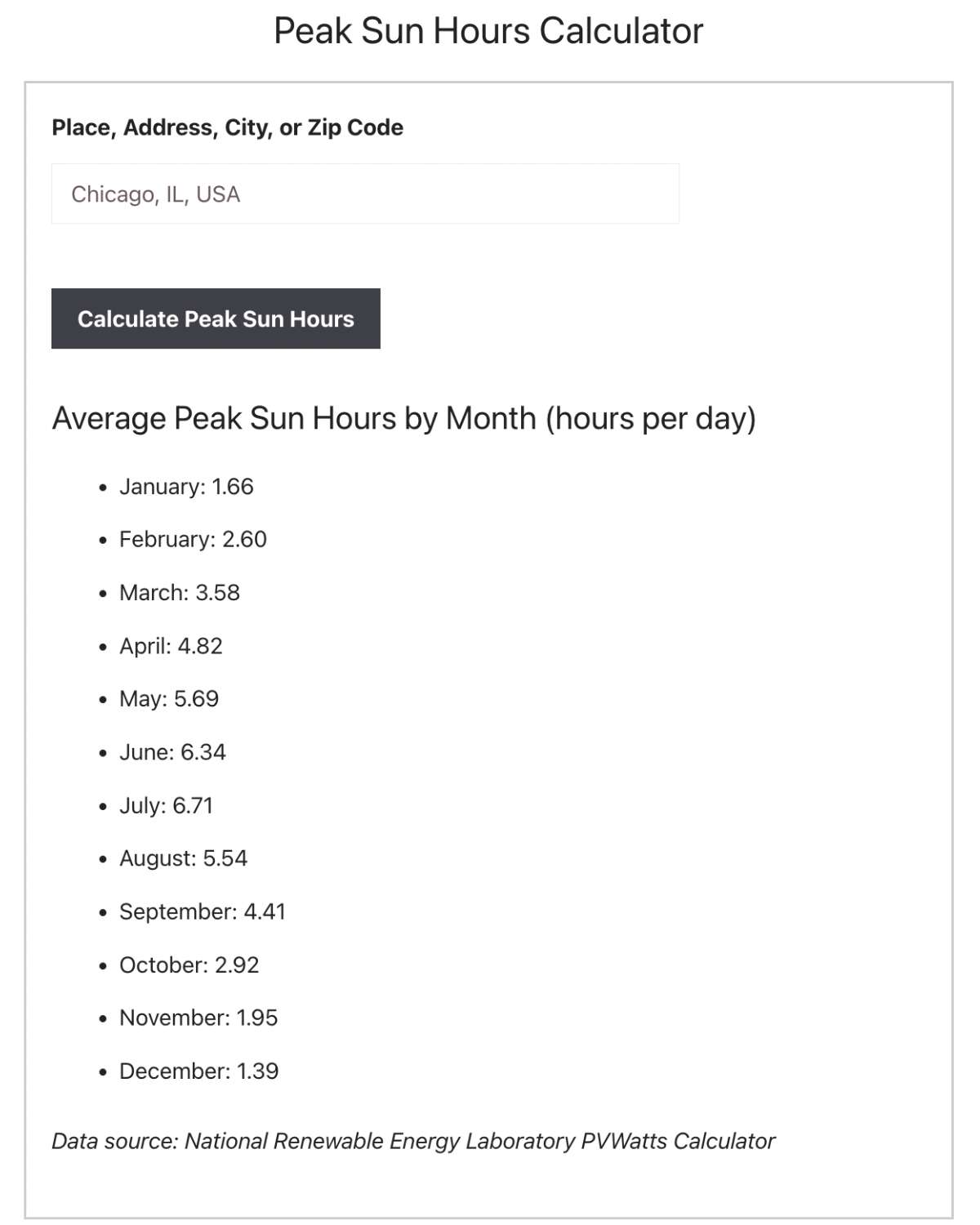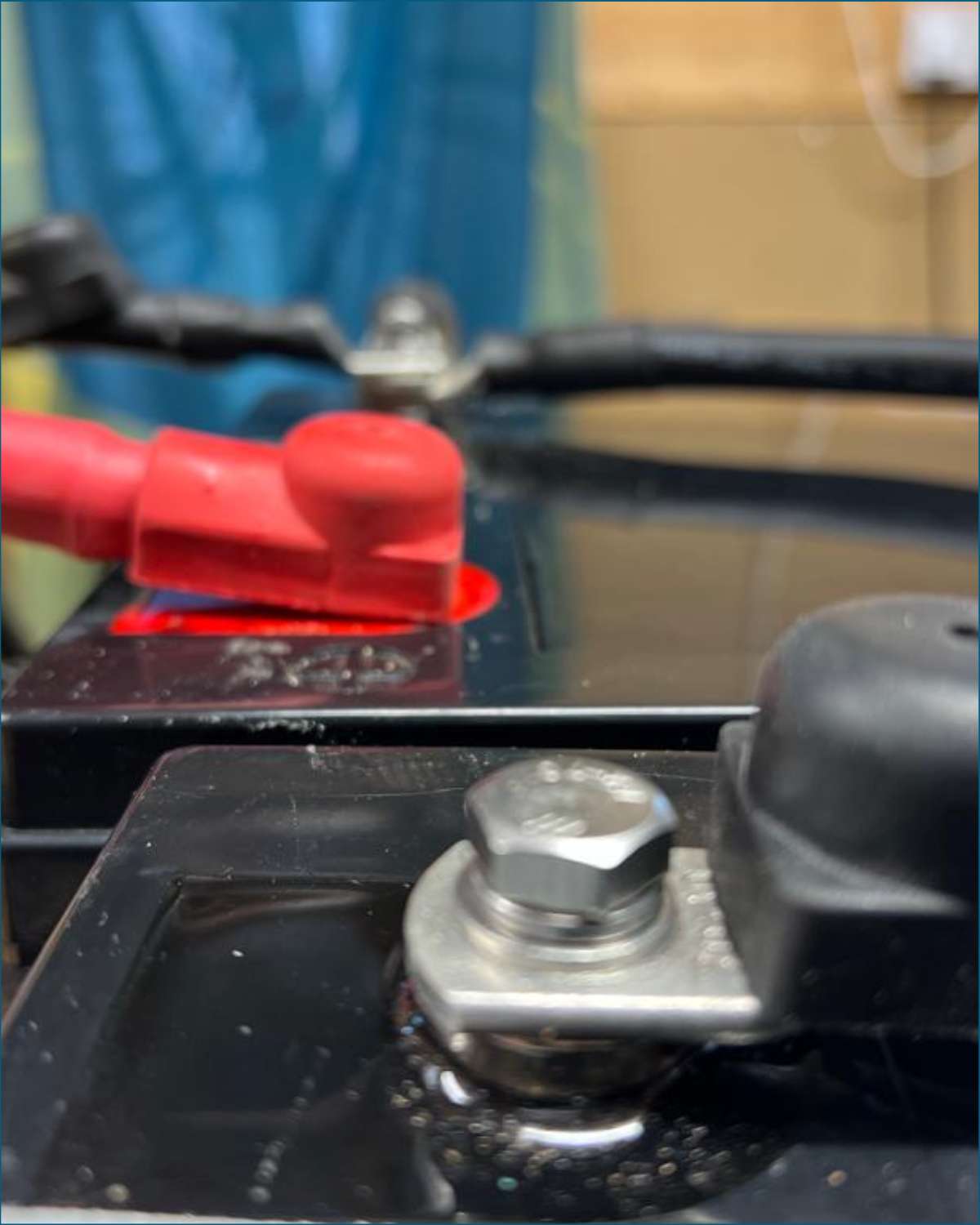Get ready for a peaceful camping experience with the best quiet generator for your RV.
Imagine going on a camping trip or an RV adventure. The last thing you want is a loud generator ruining the tranquility and serenity of the outdoors.
Quiet generators are the perfect solution for such scenarios, providing reliable power without disturbing the peace.
In this blog post, we’ll explore different types of quiet generators, factors to consider when choosing one, and tips for reducing noise.
We’ve done the research and compiled a list of the quietest generators for RV camping. From Honda’s EU2200i to Westinghouse’s iGen 2200, we’ll help you find the perfect generator that fits your needs.
With options ranging from 2000w to 3000w, you can choose between inverter generators, dual fuel generators, and more.
Plus, each generator has unique features like noise reduction technology and portability that make them stand out from the rest.
By the end, you’ll be well-equipped to find the best quiet generator for RV trips & camping adventures.
When you click on links to various merchants on this site and make a purchase, this can result in this site earning a commission. As Amazon Associates, we earn from qualifying purchases. For more info, please check our disclosure page.
At A Glance: Best Quiet Generator Options For RV Campers
 |
1. Honda EU2200i
|
CHECK PRICE ► |
 |
2. Generac 7127 IQ3500
|
CHECK PRICE ► |
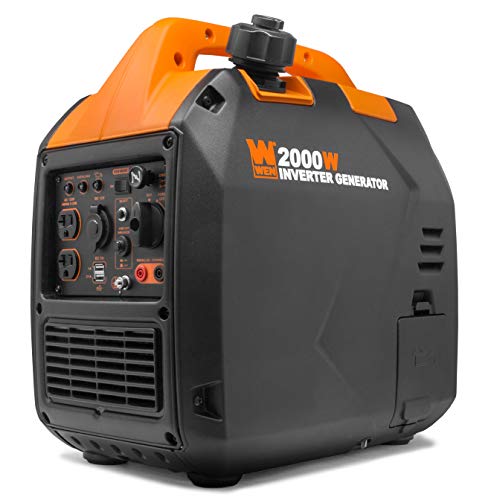 |
3. WEN 56203i 2000W Portable Inverter Generator
|
CHECK PRICE ► |
 |
4. Champion 4500W Quiet Generator
|
CHECK PRICE ► |
 |
5. Champion 3400
|
CHECK PRICE ► |
- Understand the differences between inverter, dual fuel, and portable generators to make an informed decision.
- Consider factors such as power requirements, noise levels, fuel type/efficiency & portability when choosing a quiet generator.
- Reduce noise through proper placement of the generator & soundproofing techniques. Ensure regular maintenance for optimal operation.
Understanding Quiet Generators
With various generators available, it’s essential to understand the differences to make an informed decision.
Quiet generators are designed to produce minimal noise, generally below 60 dB, while providing the necessary power for various applications.
They can be used for emergency power during outages, powering tools at worksites, and supplying energy for recreational activities like camping or RVing.
In the world of quiet generators, there are three main types:
- inverter generators,
- dual fuel generators, and
- portable generators.
Inverter Generators
Inverter generators are known for low noise levels, typically below or slightly above 60 dB.
They achieve this quietness through technological advancements, performance monitoring, eco-mode functionality, mufflers, and other sound-damping technology.
Inverter generators usually use gasoline as a fuel source and can adjust power output according to electric demand for greater energy efficiency and reduced noise.
Some notable examples of inverter generators include:
- WEN 56203i Portable Inverter Generator,
- Champion Power Equipment 200954 Inverter Generator,
- Honda EU2200i, and
- Westinghouse iGen2200.
Dual Fuel Generators
Dual fuel generators offer the convenience of choosing between propane and gasoline, depending on specific requirements.
This flexibility makes them an attractive option for many users.
Some examples of dual fuel generators include:
- Honda EU7000IS, which can provide power to a large RV with an output of 7,000 Watts and a 389cc engine with ECO throttle, and
- Champion 200951 is a quiet dual fuel portable generator suitable for camping.
Dual fuel generators come with various features, such as a 1.1-gallon fuel tank, noise levels between 53 and 74 dB, and the ability to use propane with the generator.
Proper placement, soundproofing techniques, and regular maintenance are essential to operate these generators optimally.
Portable Generators
Portable generators are compact, lightweight devices for easy transportation and use in various settings.
They’re powered by gas and can provide power for camping, RVing, and home use.
Portable generators can be open-frame or closed-frame.
Open-frame generators are relatively lightweight and offer greater portability, while closed-frame generators are sturdier and provide better protection from environmental elements.
These generators offer various features and benefits, including:
- quiet operation,
- longer run time,
- reduced fuel consumption,
- inverter technology, and
- energy-efficient models.
Some of the most recommended portable generators include:
- Generac iQ3500,
- Honda EU2200iTAG Super Quiet Portable Inverter Generator with CO-Minder,
- Honda EU3000IS,
- Westinghouse iGen4500, and
- A-iPower Portable Inverter Generator.
Factors to Consider When Choosing a Quiet Generator
When selecting a quiet generator, it’s essential to consider various factors such as:
- power requirements,
- noise levels,
- fuel type and efficiency,
- portability and size, and
- additional features.
These factors can influence the cost of the generator, as well as its overall performance and suitability for specific applications.
By carefully considering these factors, you can ensure that you choose the best and quietest generator for your needs.
Power Requirements
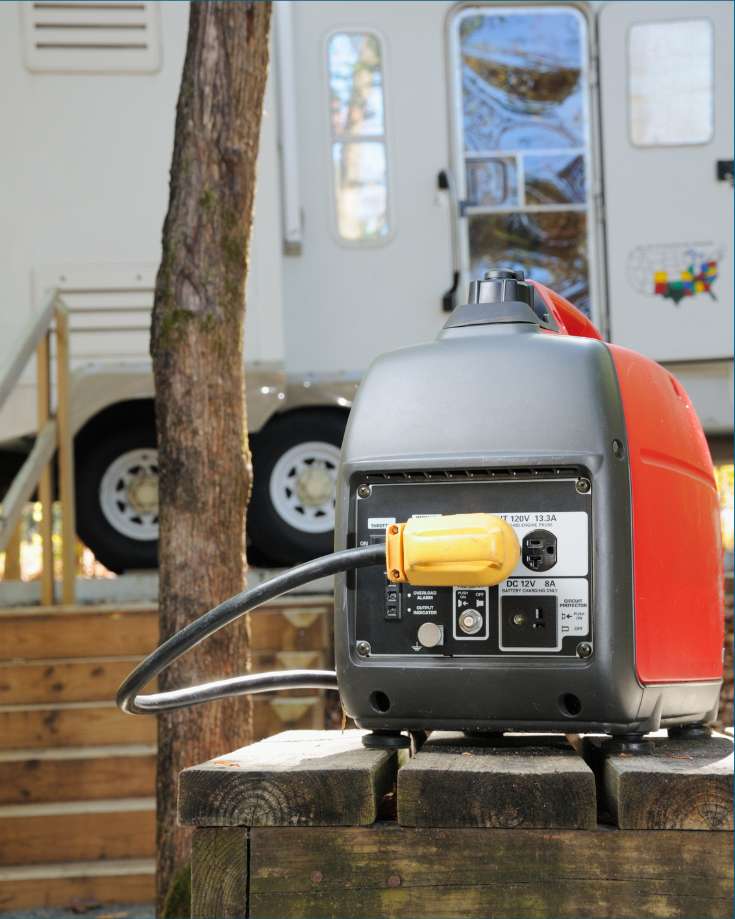
Power requirements refer to the amount of power a generator can produce, and it plays a crucial role when selecting a generator.
Wattage is a measure of power and is indicative of the power requirements of a generator.
The generator’s wattage should match the wattage of the items you plan on using.
For example, a generator with a minimum of 2,000 watts is recommended for optimal home backup. At the same time, for an RV, it is vital to consider the wattage of the items you plan on using.
Noise Levels
The typical sound level of quiet generators is approximately 50-60 dBA, making them suitable for various applications without causing a disturbance.
When selecting a quiet generator for an RV, it is important to consider noise levels, as loud generators can disturb other campers.
Noise levels are measured from a distance of 23 feet, and the power-to-noise ratio measures the amount of power generated for every decibel of noise emitted.
A decibel level of below 60 is deemed acceptable for a quiet generator.
Fuel Type & Efficiency

Choosing the right generator for your needs requires careful consideration of fuel type and efficiency.
Gasoline is one of the most common types of fuel used in generators.
It is relatively inexpensive and easy to find, but it can be noisy and produce emissions that are harmful to the environment.
Diesel fuel is another popular option as it has a higher energy density than gasoline, meaning you get more power out of each gallon.
It also produces fewer emissions than gasoline, making it more eco-friendly.
Propane is another great choice as it burns cleanly with minimal emissions and noise levels.
The type of fuel you choose will have an impact on the generator’s efficiency and performance.
Diesel engines tend to be more efficient than gasoline engines, so they require less fuel per hour of operation.
However, diesel fuel currently costs more than gasoline or propane, so you should factor this into your overall operating expenses when selecting a generator for your RV.
Additionally, diesel engines tend to be louder than other types of generators due to their higher compression ratio.
Portability and Size
Portability and size are essential factors when choosing a quiet generator, as they determine the ease of transportability and storage.
Generator size should be considered when selecting a quiet generator to ensure it’s appropriate for the available space. Also, remember to consider where you’ll store it in your RV.
The generator’s weight should also be considered when considering portability.
Additional Features
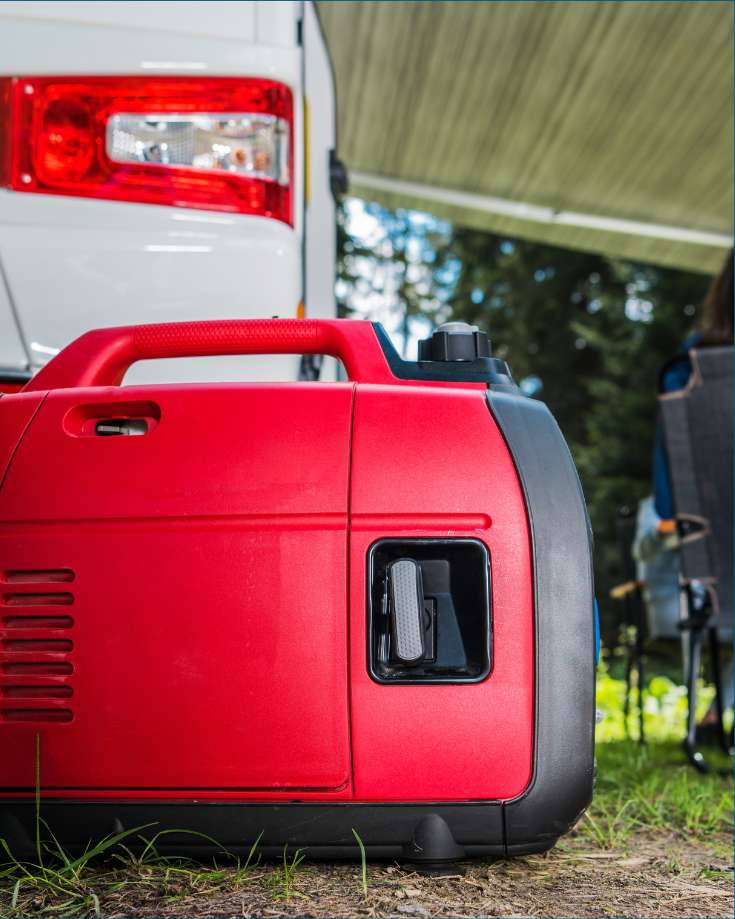
Quiet inverter generators may offer a variety of features depending on the brand and model, including:
- a compact design,
- fuel efficiency, and
- the ability to run at varying output levels.
Some models may offer additional benefits, such as parallel connectivity, remote start, and USB ports for charging small devices.
These additional features provide enhanced convenience during operation and may be worth considering when selecting a quiet generator.
Top 5 Quiet Generators for RV Campers
Now that we have explored the different types of quiet generators and factors to consider when choosing one let’s dive into the top 5 quiet generators for various needs.
We’ll cover the best overall quiet generator, the best quiet generator for home use, the best quiet generator for RVs, the best quiet generator for camping, and the best budget-friendly quiet generator.
By understanding each generator’s unique features and benefits, you can make an informed decision on the best quiet generator for your specific needs.
1. Best Overall Quiet Generator

The Honda EU2200i is the top choice for the best overall quiet generator.
For RV use, the Honda EU2200i is widely regarded as the best quiet generator, with a decibel rating of 48 dB and efficient power output.
This lightweight and portable generator produces 2200 watts of power and is fuel-efficient with a noise level of 48 dB, making it one of the quietest generators available.
The Honda EU2200i also features an Eco-Throttle system that automatically adjusts the engine speed to match the load and a fuel shut-off valve to prevent fuel from spilling out when not in use.
2. Best Quiet Generator for RV & Home Use

The Generac 7127 IQ3500 Portable Generator is a great choice for RV and home use.
It is a powerful and reliable 3,500-Watt Gas-Powered Portable Generator with economy mode producing clean electricity for sensitive electronics.
It’s RV ready with a 120V 30A RV outlet plus two 120V 20A household outlets with clean power and two convenient USB ports for easy charging of mobile devices.
The Generac 7127 IQ3500 has a starting wattage of 4250, running wattage of 3500, and noise level of 64 dBA.
It also comes with a 3-year limited warranty.
3. Best Quiet Generator for RVs

When it comes to RVs, the WEN 56203i is an ideal choice for the best quiet generator. Producing only 51 dB at quarter load, it provides a serene environment for your RV adventures.
The WEN 56203i has a maximum runtime of 10.8 hours on a full 1.0-gallon gasoline tank and is lightweight, weighing only 39 lbs.
Additionally, it’s budget-friendly, priced under $500.
This generator is perfect for those who want to enjoy the great outdoors in peace and quiet.
4. Best Quiet Generator for Camping

For a quiet camping experience, the Champion Power Equipment 100900 2000-Watt Dual Fuel Inverter Generator, Ultralight is the ideal generator, meeting all your power requirements while maintaining a low noise level of 51 dB at a quarter load.
In addition, the Champion has a maximum runtime of 10.8 hours on a full 1.0-gallon gasoline tank, ensuring you have enough power for your camping adventure.
Weighing only 39 lbs, this generator is easy to transport and is budget-friendly, priced under $500. With the Champion 2000w, you can enjoy nature’s tranquility without a loud generator’s disturbance.
5. Best Budget-Friendly Quiet Generator

The Westinghouse iGen 2200 is the ultimate budget-friendly quiet generator, boasting a noise level of 52 dB and efficient power output.
This lightweight and portable generator is perfect for those on a budget, yet it still provides a high-quality performance.
With a noise level of 52 dB, it is the quietest inverter generator on the market.
Other budget-friendly options include:
Tips for Reducing Noise from Generators
While selecting a quiet generator is essential, additional steps can be taken to reduce noise levels further.
You can ensure your generator operates as quietly as possible by employing proper placement, soundproofing techniques, and regular maintenance.
Let’s explore these tips in more detail.
Proper Placement
The placement of a generator is crucial in minimizing noise levels.
A generator should be positioned outside, at least 5 feet from any doorways, windows, or other wall openings.
The generator should also be placed on a level, dry surface and, if possible, covered with an open canopy to protect it from the elements.
Directing the engine exhaust away from windows and doors is another important consideration to minimize noise levels inside your living area.
Proper placement not only reduces noise levels but also ensures the safe operation of your generator.
Soundproofing Techniques
Soundproofing techniques can be employed to reduce noise levels from your generator further.
Some methods include using sound-absorbing materials such as acoustic foam or mass-loaded vinyl, constructing a barrier between the noise source and its surroundings, and setting the generator on a vibration-reducing rubber mat.
For RVers who spend extended periods at one RV park, additional soundproofing methods include:
- Constructing a soundproofing box or baffle box.
- Employing sound deflectors.
- Relocating the generator to a more isolated location.
These techniques can make a significant difference in minimizing the noise generated by your generator.
Regular Maintenance
Regular maintenance is essential for ensuring your generator’s proper and quiet operation.
It is recommended to check your generator’s oil level, spark plug, and air filter regularly for optimal performance.
Changing the oil after every 100 hours of operation and cleaning the air filter at the same interval will help maintain the generator’s efficiency and minimize noise levels.
Additionally, running the generator at least once every three months can help ensure suitable upkeep and optimal performance.
In Conclusion
Quiet generators are essential for those who value tranquility during outdoor adventures.
By understanding the differences between inverter, dual fuel, and portable generators and considering factors such as power requirements, noise levels, fuel type, and portability, you can make an informed decision when selecting the best quiet generator for your needs.
Remember to employ proper placement, soundproofing techniques, and regular maintenance to minimize noise levels further and ensure your generator’s safe and efficient operation.
With the right quiet generator, you can enjoy a peaceful and reliable power source, no matter where your adventures take you.
Frequently Asked Questions
What type of generator is the quietest?
Inverter generators are the quietest type of generator on the market. They produce noise levels below or slightly above 60 dB due to their compact design, small engine, and inverter technology.
Inverter generators burn fuel more efficiently, leading to quieter operation.
How many decibels is a silent generator?
Silent generators usually generate between 75-85 dB(A) at 1m. This is comparable to a normal conversation, so it is quiet enough for most people.
In other words, a silent generator produces noise on the same level as having a conversation at close range.
How are inverter generators so quiet?
Inverter generators are designed to run more efficiently and at lower output levels, reducing noise significantly. Additionally, the engine of an inverter generator is often smaller than traditional generators, and its casing is designed to keep noise to a minimum.
Thus, inverter generators provide a much quieter performance than their non-inverter counterparts.
What brand of generator is quietest?
For anyone looking for a generator that won’t disturb the peace, the Honda EU10i is the ideal choice. With its ultra-low noise output of just 52 dBA, this reliable, lightweight, high-performing generator is ideal for camping, caravanning, and other recreational activities.
Invest in the best – the Honda EU10i, the quietest generator available.
Graham Bogie

Graham is a seasoned marine electrical engineer with two decades of experience designing customized electrical systems for plant machinery and converting campers and overland vehicles. His expertise has led him to author the reputable Campervan Electrics Handbook and become the chief designer of the RV Wiring Design Tool. As a knowledgeable figure in the field, his YouTube channel, blog, Facebook group, and newsletter, offering electrical advice and product reviews, reach more than a million users each year.

